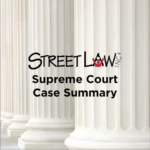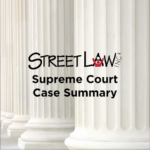One of our oldest human rights, habeas corpus safeguards individual freedom by preventing unlawful or arbitrary imprisonment. This documentary examines habeas corpus and the separation of powers in the aftermath of the 9/11 attacks as the Supreme Court tried to strike a balance between the president’s duty to protect the nation and the constitutional protection of civil liberties in four major Guantanamo Bay cases: Hamdi v. Rumsfeld, Rasul v. Bush, Hamdan v. Rumsfeld and Boumediene v. Bush.
Closed captions available in English and Spanish.
Boumediene v. Bush (2008)
Do detainees at Guantanamo Bay have the constitutional right to challenge the legality of their confinement using a writ of habeas corpus? This case summary shows how the Supreme Court answered that question in 2008.
Rasul v. Bush (2004)
Rights at Risk in Wartime
The terrorist attacks on Sept. 11, 2001, stunned the nation. As commander-in-chief, President George W. Bush responded quickly but soon all three branches of government would be embroiled in the struggle to balance national security with the protection of individual liberties amid a war on terror. This lesson plan is based on the Annenberg Classroom video “Habeas Corpus: The Guantanamo Cases.” The four cases are examples of how the Supreme Court, the president and Congress fought to balance national security and civil liberties during the war on terror. At the heart of each case was the constitutional right of habeas corpus, the right to have one’s detention or imprisonment reviewed in court.
Hamdan v. Rumsfeld (2006)
Does the Detainee Treatment Act take away the Court’s authority over habeas petitions filed by Guantanamo detainees that were pending at the time of its passage? This case summary shows how the Supreme Court answered that question in 2006.
Major Events of the Cold War
In this lesson, students will use short video clips to learn about major events occurring during the Cold War, the causes of these events, and their impact on the U.S., Soviet Union, and the world. Students will summarize this information by providing a written response that analyzes the legacy of the Cold War.
Hamdi v. Rumsfeld (2004)
Can a U.S. citizen captured in Afghanistan, who the President claims was an “enemy combatant,” be detained indefinitely? This case summary shows how the Supreme Court answered that question in 2004.
Our Rights
The book Our Rights, written by David J. Bodenhamer, uses historical case studies to explore the rights in the Constitution. Supreme Court cases are used to demonstrate how a right received its modern interpretation, how the right applies today, and how courts and other interpreters seek to balance this right with important societal concerns such as public safety. The complete book or individual chapters can be downloaded.

